Is Google biased? An SEO veteran’s perspective
This deep dive uses SEO tools and data analysis to explore the claims, controversies, and facts behind political search results.
One question that we’ve been hearing over and over again since the 2016 election is:
Is Google biased?
There are no shortages of opinions.
Sundar Pichai went before Congress in 2018 and swore under oath, “I’m confident we don’t approach our work with any political bias.”
He also sent an internal memo to staff warning them against letting their personal politics affect their work.
Elon Musk, on the other hand, posted to X, “Google is controlled by far left activists.”
A conservative organization, the Media Research Center, routinely posts articles that show supposed “proof” of Google’s political bias, while left-leaning Vox posted an article mocking conservatives for not understanding how SEO works.
If you’re like me, you’re just reading all the back-and-forth and getting tired of it.
Too many opinions on both sides are based on confirmation bias, sensationalism, or a fundamental misunderstanding of how SEO really works.
And so I thought I’d jump into this hornet’s nest.
Like everyone else, I have my own biases but I’m going to do my best to keep them at bay.
Instead, let’s use SEO tools and techniques to see if we can come to a definitive answer.
‘Google bias’ in the 2024 election?
Throughout the 2024 election, there were many stories about Google’s supposed “bias.”
Let’s take a look at some of the more prevalent ones.
In June, the Media Research Center accused Google of “blacklisting” President Trump’s official campaign website because it wouldn’t rank for [donald trump presidential race 2024] and [republican party presidential campaign websites].
The problem with this is that even a junior SEO could have seen that Donald Trump’s website was pretty horrifically optimized.
Their home page title tag read Home | Donald J. Trump, and most of their substantive content was hidden in a PDF.
In July, many people including Donald Trump, Jr. accused Google of “election interference” because Google autocomplete would not suggest President Trump’s name when someone typed in “assassination attempt on…”
Google’s official explanation was that they have “protections in place against autocomplete predictions associated with political violence.”
To be honest, I didn’t buy that (I could see autocomplete for other contemporary figures), but I just chalked it up to Google autocomplete was embarrassingly slow to update.
The third incident to make waves was on Election Day, when searches for [how to vote harris] spawned a box that told people where to go for their nearest polling place, while [how to vote trump] did not.
Google PR explained that this was because “Harris” is also the name of a county in the U.S., while “Trump” is not.
Again, a perfectly plausible explanation.
Thousands of conservative accounts jumped on these incidents as definitive proof of Google interfering in the election.
The mistake they made was assuming that Google is infallible.
In reality, anyone with a passing understanding of Hanlon’s Razor – which suggests we should not attribute to malice what can be explained by incompetence – would see that it applied in all three cases.
Accusations of Google bias
The problem with focusing on noise like this is that it detracts from the real question.
Do Google search results have bias, and is that bias enough to unduly influence people?
Through the years, a number of whistleblowers and researchers came forward with supposed proof of Google bias. Some highlights:
- In November 2016, following the presidential election, an anonymous source within Google sent a leaked video to the conservative outlet Breitbart showing Google executives’ and employees’ negative reaction to the election results.
- In subsequent years a number of whistleblowers from within Google came out to provide their reports of bias that they perceived within Google.
- In July 2019, senior engineer Greg Coppola came forward to publicly disagree with his CEO’s claim that searches were unbiased.
- In August 2019, senior software engineer Zach Vorhies released hundreds of pages of internal Google documents that allegedly showed evidence of manipulation, from intervening in the algorithm to maintaining blocklists.
- One of the more interesting presentations was about “algorithmic unfairness,” which discussed the need for search results to reflect a desired state, even if it didn’t reflect current realities.
- While not a Google employee, Robert Epstein was a research scientist who went on a number of conservative outlets with research purporting to show Google manipulating public opinion.
The problem with all of this? Because this evidence was mainly hearsay, opinions were split like a Rorschach test.
Conservatives, including members of Congress, pointed to them as definitive proof of Google’s bias, while many in the mainstream media dismissed them as conspiracy theories.
The facts
Let’s take a step back and look at objective facts:
- From 1998 to 2018, Google was powered by their original algorithm based mainly on PageRank. That worked really well in the beginning but as more people understood Google’s algorithm, poor quality sites began to rank. Despite their efforts with Panda and Penguin, it became clear that too many legitimately dangerous sites were making their way into Google’s results.
- The Aug. 1 2018 broad core update (a.k.a., the Medic Update) was Google’s first big attempt to go beyond reactively fighting content and link manipulation and proactively combat this, starting with financial and medical topics (YMYL).
- Most of us in the SEO space had our suspicions that Google was putting its finger on the scales for other types of searches. In May 2024, leaked documents from Google confirmed that Google’s organic algorithm indeed treated COVID and election-related searches differently than others through two factors called IsCovidAuthority and IsElectionAuthority, respectively.
None of this is a smoking gun either.
Those who attack Google say this circumstantial evidence is enough to prove Google’s bias.
Defenders of Google will say that all of these steps were necessary to fight the real problem of bona fide misinformation and scams.
The data
So, is Google biased?
Instead of giving you my opinion, I’m going to show you how you can use SEO tools and techniques to figure it out for yourself.
The two tools I use most often for my SEO work are Semrush and Ahrefs. Both of them have a useful feature: the ability to go back in history and see historical SERPs.
For example, these are the top 10 organic results for searches on “donald trump” that Semrush reports from October 2024, one month before Election Day.
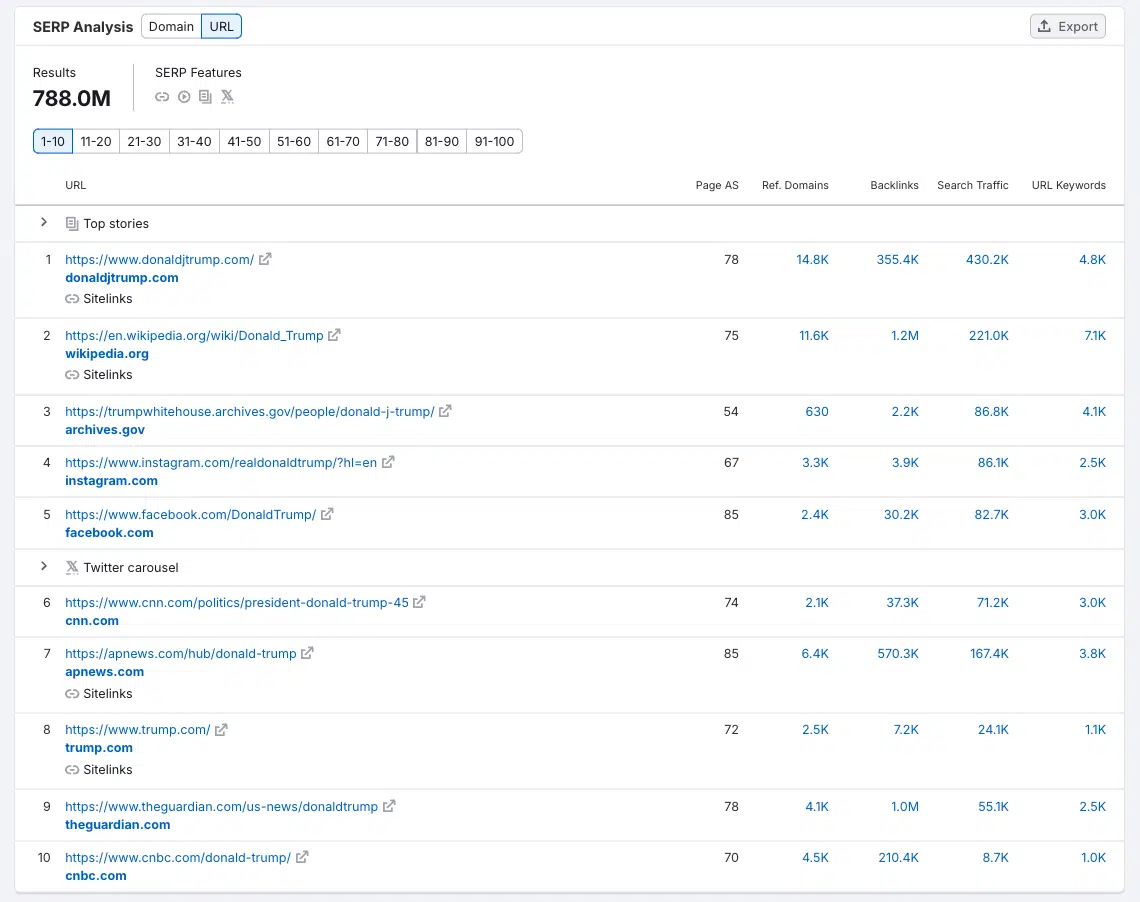
And here’s what Ahrefs reports for October 15, 2024.
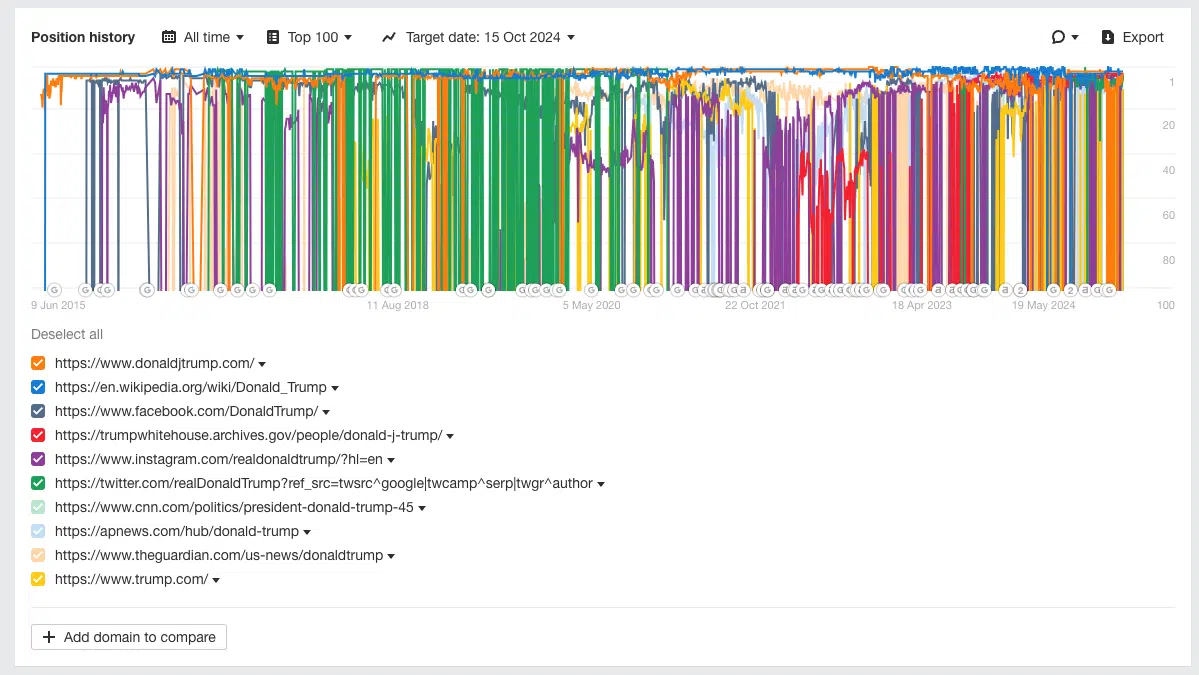
Both are similar.
The slight variations are due to variations in the way that Semrush and Ahrefs obtain their Google results.
We’re still in Rorschach test territory.
Those who accuse Google of bias will look at the results and cry foul because CNN, AP, Wikipedia, and The Guardian – all known for being left-leaning – are showing up.
Those defending Google will point to Donald Trump’s website and his multiple social media accounts showing up as proof that Google is unbiased.
What if we could take a look at every question that people asked about Donald Trump and Kamala Harris during the election, take the top 10 results for each, and run an analysis of which media outlets are cited most often?
We can. Here’s how.
For this one I’m going to use Ahrefs (which allows me to output 1,000 queries and their top 10 positions and to filter based on date).
- I searched for “Questions” that people ask about “donald trump.” I filtered on searches that were seen before Election Day 2024.
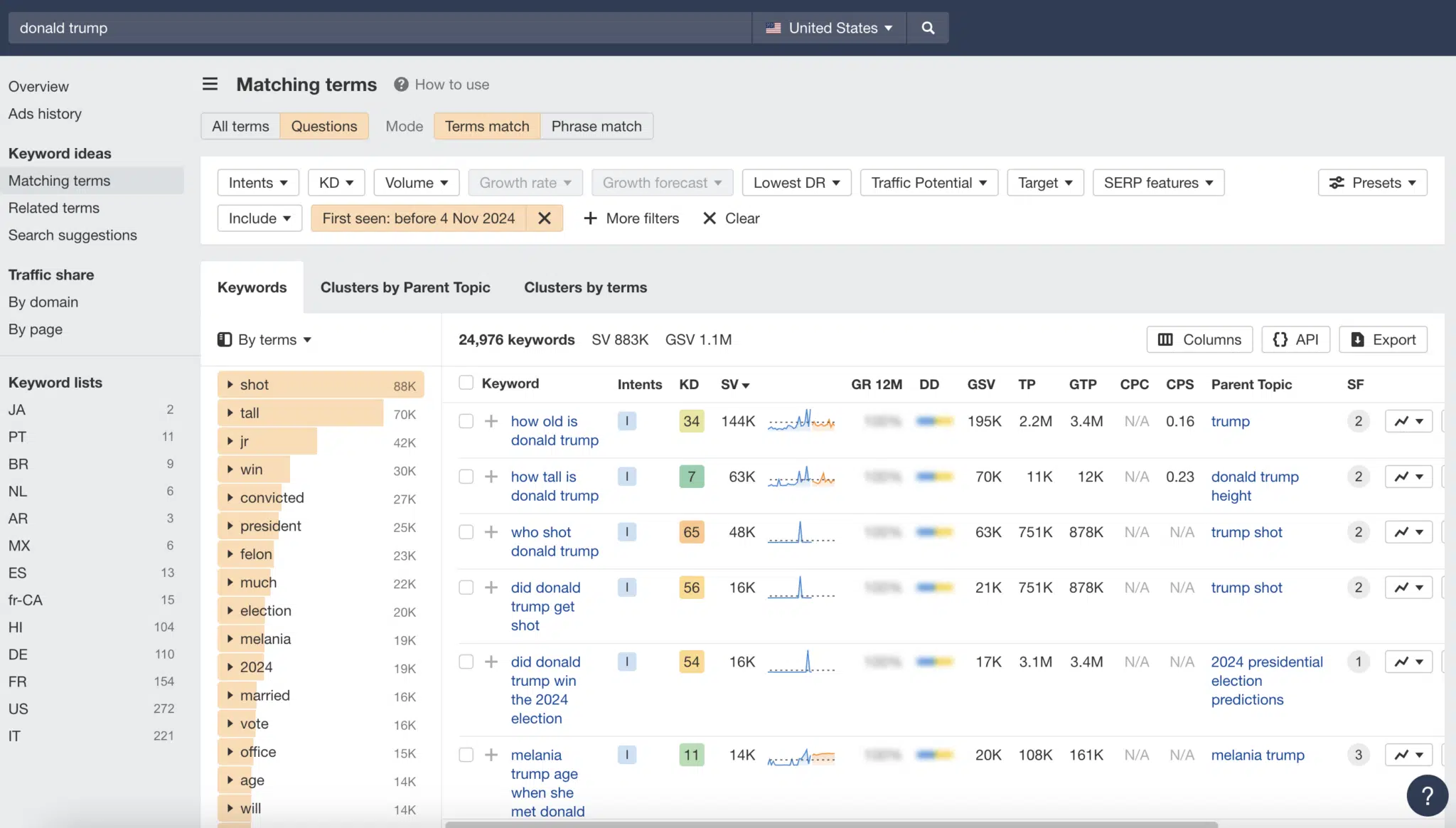
- Next, I exported the top 1,000 questions with the top 10 positions for each.

- I uploaded the CSV file to ChatGPT and asked it to go through the list and tally up how often each news outlet or website appeared.

- I repeated the process for questions containing “kamala harris” and tallied everything up. At this point I had a list of all sites that ranked in the top 10 for the top 1,000 questions about Trump and Harris.
- Next, I cross referenced this list with media bias charts from AllSides.
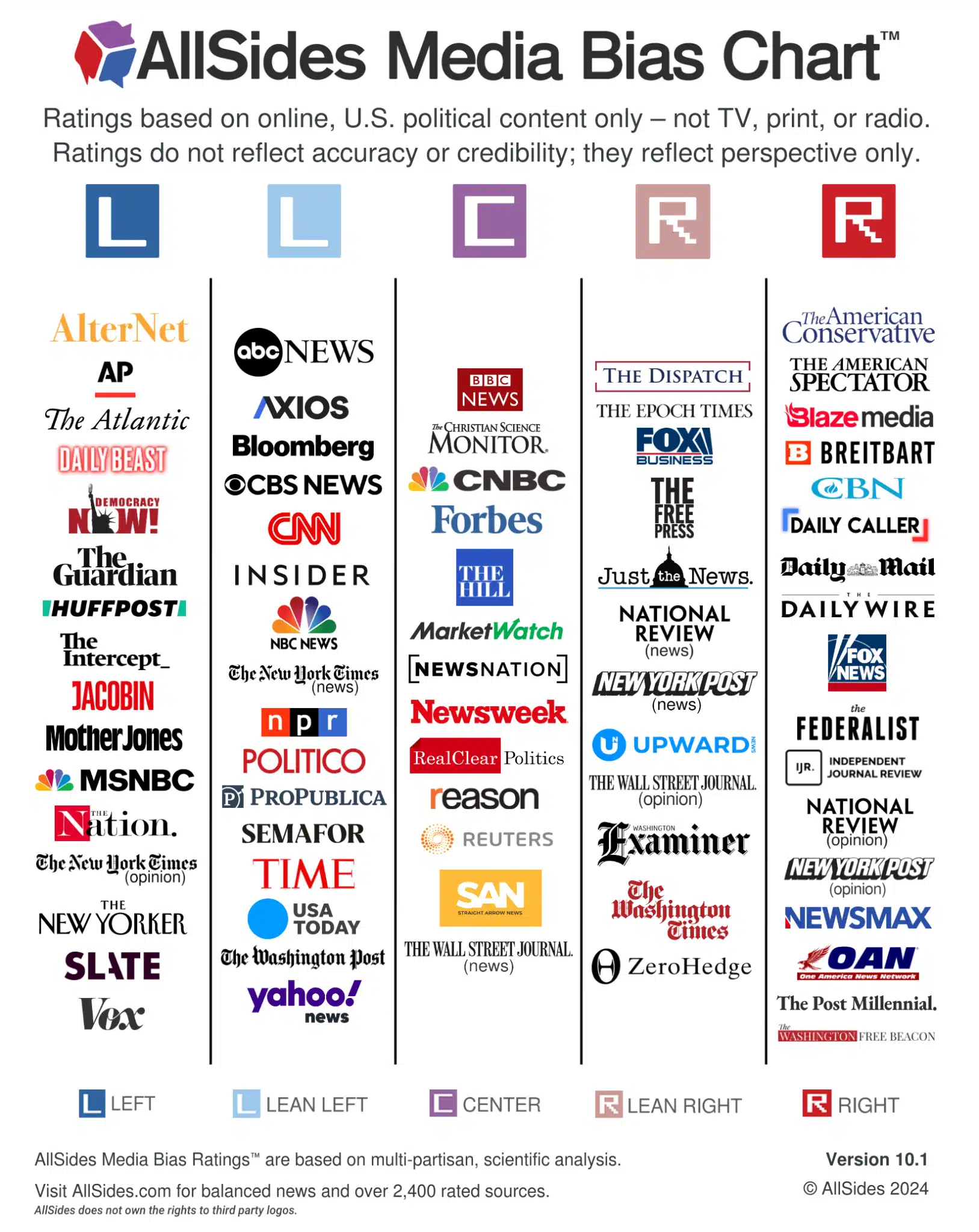
My goal here was to see whether Google organic search favored sites of a particular political persuasion. Here’s what the results were.

To double-check, I cross-referenced the list against Ad Fontes Media’s Static Media Bias Chart.
I took every site they listed in this chart that was rated 24.0 and above in News Value and Reliability.

Neither AllSides nor Ad Fontes are perfect.
For example, the left will likely disagree with AllSides’s characterization of AP as “left,” while the right will likely disagree with Ad Fontes’s characterization of RealClearPolitics as “strong right.”
But on the whole, these are the best out there (at least as far as Google is concerned).
Is this proof of Google’s bias?
I’m going to get half of America mad at me now.
Yes, there is pretty clear evidence that Google’s organic results demonstrate bias when it comes to political searches.
But don’t take my word for it. Repeat the process above for any political phrase you can think of.
Note that Google is not “censoring” conservative and right-leaning outlets – you can still find them in search results if you search on their brand name.
But do any kind of non-branded search and you’ll be hard-pressed to find them ranking.
It wasn’t always this way.
Note in this screenshot how in August 2016 it was fairly common to see centrist outlets like RealClearPolitics and right-leaning outlets like the Washington Times alongside left-leaning outlets like CNN and The Atlantic for searches for “donald trump.”
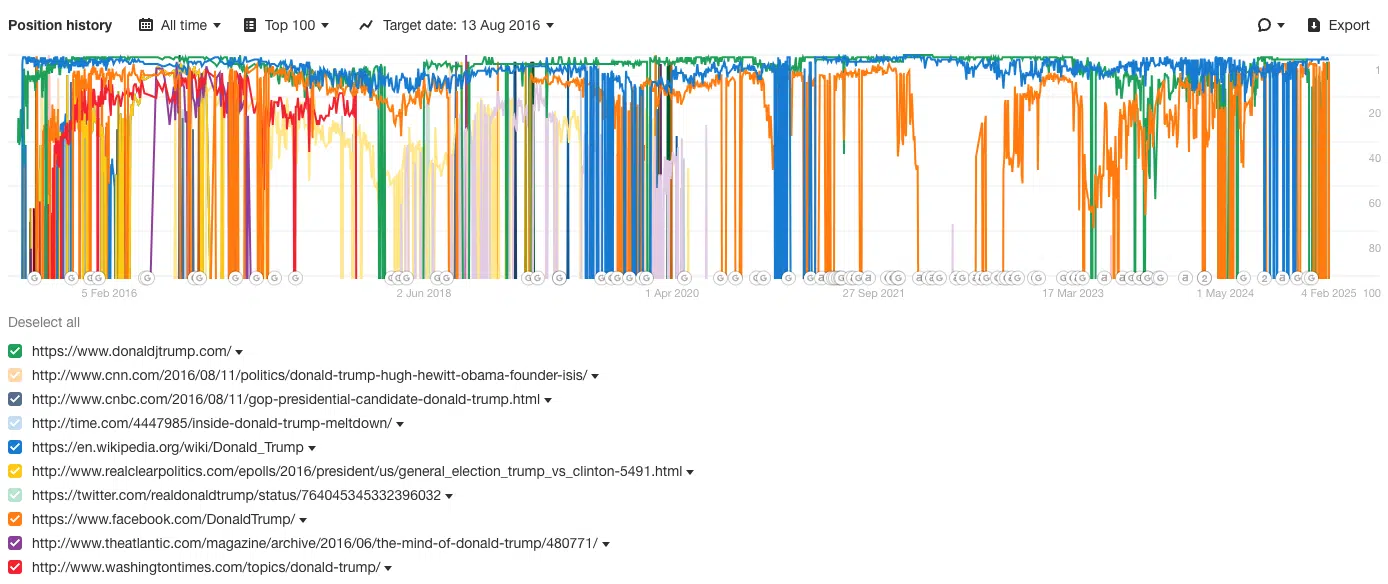
You can see from this chart of SEO traffic and keywords what happened to RealClearPolitics.
Somewhere around April 2020, their SEO traffic and keywords fell off a cliff.
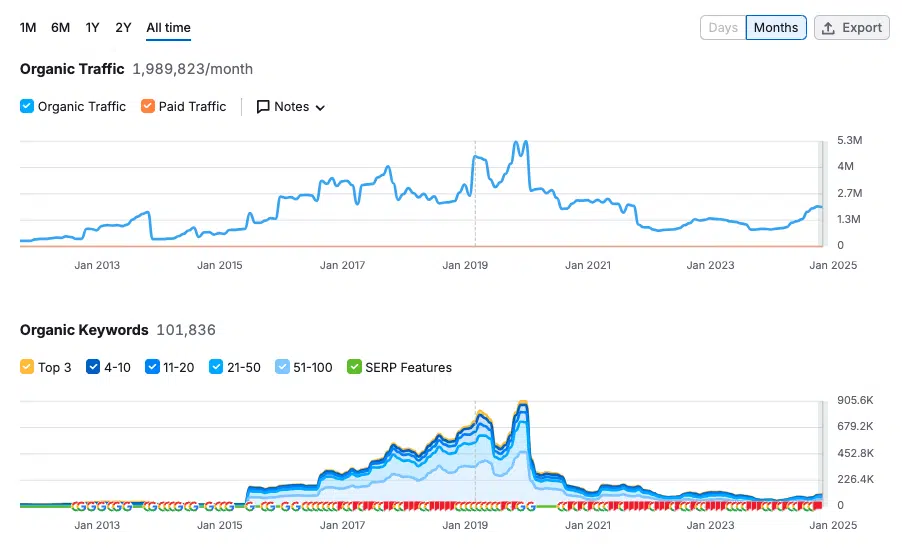
Today, 92% of their Google traffic comes from branded searches.
Contrast that to The Atlantic, where 78.4% of SEO traffic is unbranded.

You can see similar patterns around that time with other right-leaning sites like The Blaze, The Federalist, and Breitbart, as well as left-leaning sites like Mother Jones and HuffPost.
While those sites flailed in SEO, mainstream news sites like The New York Times and CNN skyrocketed.
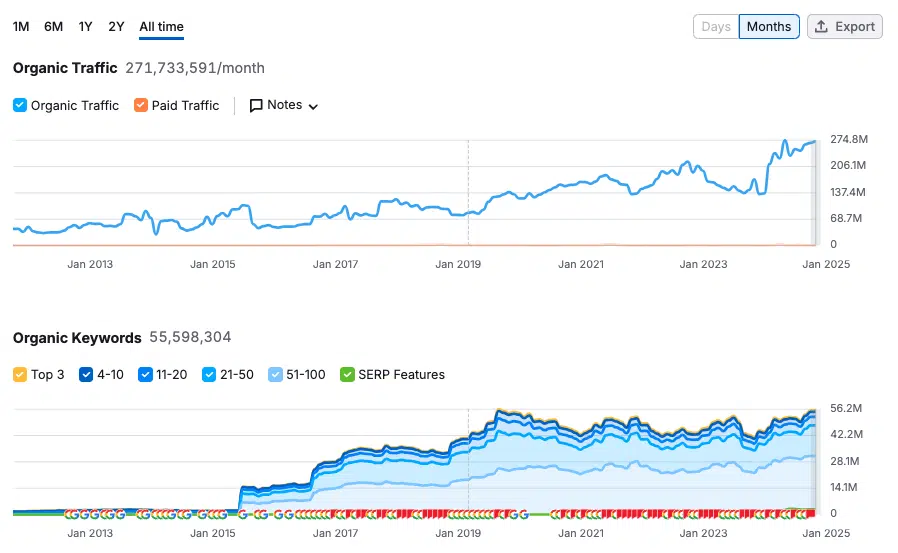
What happened?
In 2020, Google likely implemented changes similar to those in its 2018 Medic update.
The Medic update aimed to protect users from harmful health and finance content.
At the time, black hat SEO tactics allowed fraudulent sites to outrank legitimate ones, leading to financial scams and misinformation, in thousands of cases harming the most vulnerable populations.
Many elderly and low-income individuals were defrauded, and those with serious illnesses were misled by false medical claims.
To counter this, Google manually boosted high-authority sites to ensure reliable information surfaced.
Internally, many within Google likely viewed political content as an extension of the “Your Life” portion of YMYL.
This likely led to the creation of a list of trusted and untrusted sources.
While that information isn’t public, it’s not a stretch to assume it’s similar to the one maintained by Wikipedia editors, one which left-leaning individuals may find reasonable and right-leaning individuals would find extremely biased.
How one-sided news can affect public opinion
Here’s an example of how a lack of diverse perspectives can create a one-sided narrative.
In April 2020, during the COVID-19 lockdown, the virus was spreading rapidly, especially affecting the elderly, with no vaccine or cure in sight.
On April 23, the White House held a press conference where William Bryan from DHS shared promising research updates. (You can read the full transcript here.)
Specifically, he discussed the effects of sunlight and UV rays on the coronavirus and briefly mentioned the effectiveness of isopropyl alcohol in killing the virus on surfaces.
Following Bryan’s remarks, President Trump asked about potential clinical applications of the findings.
I think most would agree his wording was inartful and a bit bombastic, but fact-checking organizations would go on to conclude that he never suggested drinking or injecting household bleach.
A year later, peer-reviewed studies confirmed UV light as a viable concept.
However, a Google search for “trump bleach” immediately after the press conference presented a different picture:
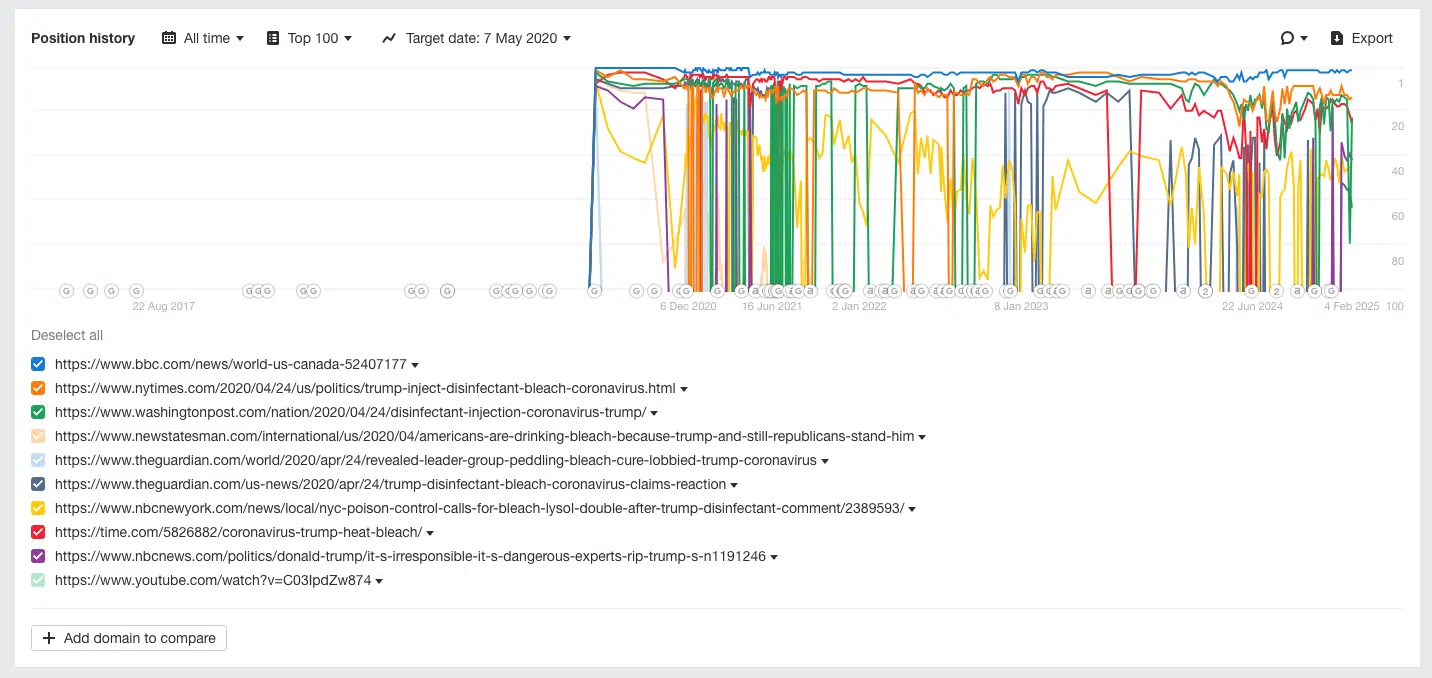
- The BBC ranked No. 1 with the headline: “Coronavirus: Trump suggests injecting disinfectant as treatment.”
- The New York Times was No. 2 with: “Trump’s Suggestion That Disinfectants Could Be Used to Treat Coronavirus Prompts Aggressive Pushback,” accompanied by a stock photo of household bleach.
- The Washington Post was No. 3 with: “Trump asked if disinfectants could be injected to kill coronavirus inside the body. Doctors answered: ‘People will die.’”
The rest of the top results followed the same narrative – mocking or criticizing Trump for allegedly encouraging Americans to ingest or inject household bleach.
This could be attributed to the “fog of war,” but independent and conservative outlets provided alternative perspectives that were virtually invisible in search results.
For instance, RealClearPolitics published the full video and transcript on the day of the press conference, allowing readers to judge for themselves – yet it didn’t even rank in the top 100.
Did Google do anything wrong?
Now I’m going to upset the other half of America.
Did Google do anything wrong?
Not really.
Yes, Google likely tilts the scales – especially in amplifying smaller left-leaning sites over their right-leaning counterparts.
But even if Google didn’t interfere, the mainstream media would still dominate the top 10 rankings for most searches.
Most of us in SEO have experienced the frustration of seeing a niche site with outstanding content outranked by lower-quality content from an “authority” like Reddit or YouTube.
Similarly, major outlets like CNN and The New York Times have far more links and traffic than any conservative or progressive news site.
Big brands dominate the top results, while smaller sites fight for long-tail visibility. That’s how it’s been for a long time.
It’s also worth noting that Google is a private company.
The First Amendment protects speech from government interference – it doesn’t apply to private entities.
Unless the government is compelling Google’s actions, the company is free to serve up whatever results it wants.
Conservatives who cry foul at Google’s dominant position might want to remember how they pushed back in the 1990s against those who wanted to reinstate the Fairness Doctrine when conservative talk radio gained influence.
Their argument back then was that the free market of ideas would self-correct.
This worked to some extent in broadcast and cable news.
MSNBC emerged as a counterbalance to Fox News.
Podcasters like Joe Rogan and the social media platform X attracted audiences seeking more transparency and alternative perspectives outside mainstream media and Google News.
In August 2024, Judge Amit Mehta issued a ruling confirming what many in SEO had long anticipated: Google had maintained a monopoly in General Search Services, covering both paid and organic search.
Evidentiary hearings are set for April 2025, with a final ruling expected by August 2025.
Whether these remedies will – or even can or should – compel Google to present a more diverse range of opinions remains uncertain.
But in my view, a bigger threat to Google is on the horizon.
The future of news
The bigger threat to Google is people realizing that there is a powerful alternative to their curated political content: AI.
Here’s an example: I asked xAI’s Grok to present both perspectives of a highly contentious political question.
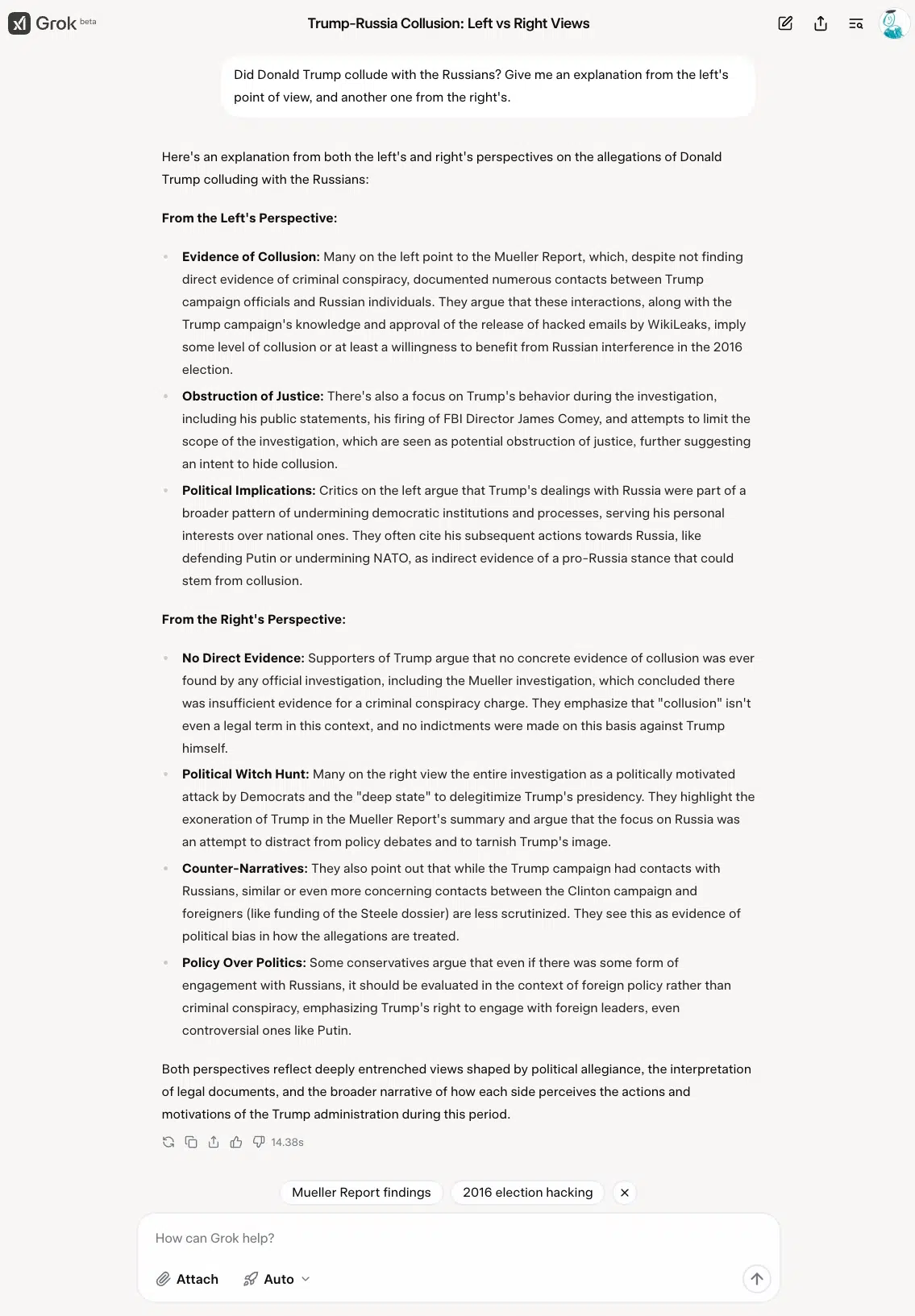
You’ll find similar responses on ChatGPT, Claude, Perplexity, and others.
For the first time in eight years, I finally received a balanced answer – one that represents both sides fairly (or, if you prefer, equally unfairly).
Last year, I predicted that people would gradually shift to AI chatbots for search. I began that article predicting it would take three years.
But less than a year later, I find the majority of my own “searches” now happen on ChatGPT and Grok.
This shift reminds me of the search landscape in the late 1990s, when companies like Excite, Lycos, AltaVista, Yahoo, and Google were competing to be the top search engine.
Google won by offering the best experience.
It took years before content manipulation and link schemes forced algorithm updates like Panda and Penguin.
Today, a similar race is underway. ChatGPT, Gemini, DeepSeek, Claude, and Grok are vying to become the new search standard.
Unlike Google, searches won’t take the form of one or two keywords, but detailed questions unlocking an expansive long-tail of search queries.
Many assume the U.S. political landscape consists of two sides, but in reality, there are 335 million perspectives – each shaped by unique experiences and biases.
Since 1998, we’ve been conditioned to search for head terms and accept Google’s 10 organic results as the authoritative answer.
But I continue to believe that the winner of the AI wars will be the platform that, like early Google, embraces free speech and classical liberalism.
That means using training data that reflects all viewpoints – even those that company insiders might find uncomfortable – and allowing AI to answer questions honestly.
We’ve already seen DeepSeek censor viewpoints that conflict with the Chinese government, as well as how trying to solve for “algorithmic unfairness” made Google Gemini look silly.
Can any American AI companies resist the temptation to limit AI’s knowledge by limiting its access to information and forcing it to follow their internal bias rather than objective truth?
We’ll find out in four years.
Contributing authors are invited to create content for Search Engine Land and are chosen for their expertise and contribution to the search community. Our contributors work under the oversight of the editorial staff and contributions are checked for quality and relevance to our readers. The opinions they express are their own.
Related stories